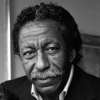Gordon Parks

Gordon Parks
Gordon Parkswas a noted American photographer, musician, writer and film director, who became prominent in U.S. documentary photojournalism in the 1940s through 1970s—particularly in issues of civil rights, poverty and African-Americans—and in glamour photography. As the first famous pioneer among black filmmakers, he was the first African-American to produce and direct major motion pictures—developing films relating the experience of slaves and struggling black Americans, and creating the "blaxploitation" genre. He is best remembered for his iconic photos of poor Americans...
NationalityAmerican
ProfessionPhotographer
Date of Birth30 November 1912
CityFort Scott, KS
CountryUnited States of America
So I went to Chicago in 1940, I think, '41, and the photographs that I made there, aside from fashion, were things that I was trying to express in a social conscious way.
And I think that after nearly 85 years upon this planet that I have a right after working so hard at showing the desolation and the poverty, to show something beautiful for somebody as well.
I think maybe the rural influence in my life helped me in a sense, of knowing how to get close to people and talk to them and get my work done.
I think most people can do a whole lot more if they just try.
I suffered first as a child from discrimination, poverty ... So I think it was a natural follow from that that I should use my camera to speak for people who are unable to speak for themselves.
I've been asked if I think there will ever come a time when all people come together. I would like to think there will. All we can do is hope and dream and work toward that end. And that's what I've tried to do all my life.
Think in terms of images and words. They can be mighty powerful when they are fitted together properly.
Washington, D.C. in 1942 was not the easiest place in the world for a Negro to get along.
The man at Kodak told me the shots were very good and if I kept it up, they would give me an exhibition. Later, Kodak gave me my first exhibition.
There's another horizon out there, one more horizon that you have to make for yourself and let other people discover it, and someone else will take it further on, you know.
I have a strange feeling back here, ... I can't explain it. It's a strange mixture of the tragedies and the good things that happened here.
Nothing came easy. I was just born with a need to explore every tool shop of my mind, and with long searching and hard work. I became devoted to my restlessness.
I don't try to make the first move; I always wait for them to make it. He was trying to go for my legs, and that's something I've worked on countering.
I want to go home. They're waiting for me there.